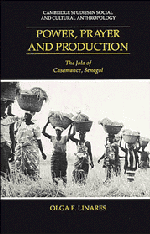Crossref Citations
This Book has been
cited by the following publications. This list is generated based on data provided by Crossref.
Richards, Paul
1996.
Forest indigenous peoples: concept, critique and cases.
Proceedings of the Royal Society of Edinburgh. Section B. Biological Sciences,
Vol. 104,
Issue. ,
p.
349.
Nugent, Paul
1996.
An Abandoned Project?.
The Journal of Legal Pluralism and Unofficial Law,
Vol. 28,
Issue. 37-38,
p.
203.
Gable, Eric
1997.
A Secret Shared: Field work and the Sinister in a West African Village.
Cultural Anthropology,
Vol. 12,
Issue. 2,
p.
213.
Linares, Olga F.
2002.
African rice (Oryza glaberrima): History and future potential.
Proceedings of the National Academy of Sciences,
Vol. 99,
Issue. 25,
p.
16360.
Boone, Catherine
2003.
Political Topographies of the African State.
Buckner, Margaret
2004.
Ce que nous dit la cloche manjako.
L Homme,
p.
219.
Linares, Olga F.
2005.
Jola Agriculture at a Crossroads.
Canadian Journal of African Studies / Revue canadienne des études africaines,
Vol. 39,
Issue. 2,
p.
230.
Bosc, Pierre-Marie
2005.
À la croisée des pouvoirs.
p.
285.
Foucher, Vincent
2005.
La guerre des dieux? Religions et séparatisme en Basse Casamance.
Canadian Journal of African Studies / Revue canadienne des études africaines,
Vol. 39,
Issue. 2,
p.
363.
Toliver-Diallo, Wilmetta J.
2005.
“The Woman Who Was More Than a Man”: Making Aline Sitoe Diatta into a National Heroine in Senegal.
Canadian Journal of African Studies / Revue canadienne des études africaines,
Vol. 39,
Issue. 2,
p.
340.
Marut, Jean-Claude
2005.
Les racines mondiales du particularisme casamançais.
Canadian Journal of African Studies / Revue canadienne des études africaines,
Vol. 39,
Issue. 2,
p.
315.
Baum, Robert M.
2009.
Concealing Authority: Diola priests and other leaders in the French search for a suitable chefferie in colonial Senegal.
Cadernos de Estudos Africanos,
p.
35.
Tomàs, Jordi
2009.
¿Un Rey Sagrado en el Siglo XXI? La realeza joola de Oussouye revisitada.
Cadernos de Estudos Africanos,
p.
71.
Goerg, Odile
2019.
Ving-cinq ans après.
p.
105.
Igboin, Benson Ohihon
2022.
The Scramble for Religion and Secularism in Pre-Colonial Africa.
Religions,
Vol. 13,
Issue. 11,
p.
1096.
O'Donoghue, Meghan
2024.
Alinesitoué Diatta: Rebel Leader or Colonial Scapegoat?.
French Historical Studies,
Vol. 47,
Issue. 3,
p.
481.



